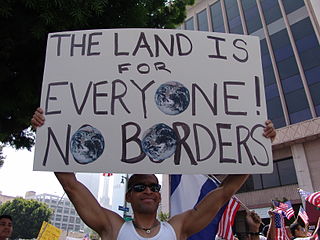I’ve recently been reading the scholarly literature on migration and development. In this blog post, I attempt to summarize my understanding of important ways in which researchers in the area are similar to and important ways that they differ from open borders advocates. Then, I’ll discuss what I think both sides can learn from each other.
For examples of the sort of things I’ve been reading, consider this 2007 report for the Department for International Development in the UK, this article on labor migration in India, the World Bank People Move blog, and the websites of KNOMAD and Migrating out of Poverty.
Who are the migration and development scholars who’ve explicitly endorsed radically freer migration?
Some scholars of migration and development are quite sympathetic to the logic of open borders, want the world to move as far as possible in that direction, and explicitly say so. One example is Michael Clemens. While he has expressed some terminological disagreement with “open borders” as a term, he accepts the basic moral logic, he’s all for the main aspects of open borders, and he supports moving as far in that direction as is feasible. Clemens is a co-creator of the place premium and income per natural concepts. He has raised the status in the economic development community of the idea that development is about people, not places. And he wrote the paper that prompted Bryan Caplan to come up with the double world GDP slogan. Note that Clemens isn’t famous solely as a migration researcher; he has also been at the forefront of critiquing some aspects of the Millennium Villages Project.
Another migration scholar who’s expressed considerable sympathy for the open borders position is Lant Pritchett. Pritchett co-authored the place premium paper with Clemens, and has also written a book advocating for freer migration. Pritchett is a renowned development economist who has done considerable work on many areas unrelated to migration, including the return to schooling worldwide and the relation between desired and actual fertility and the importance of contraception to fertility reduction.
How has the community of development scholars changed its views on migration?
I haven’t been able to get a very clear picture, but it seems to me that the international development community as a whole used to be more hostile to migration as a poverty reduction strategy, but they are now more open to it. The following are some general observations:
- Brain drain was considered a major argument against migration among development scholars, but the balance of the evidence in recent years has moved scholars to the view that the problem is not severe, with many scholars believing that brain circulation and idea flows can be beneficial on net.
- Historically, the dominant view in the international development community has been similar to the view of many mainstream moderate pro-immigration people that John Lee described here, namely, that migration is not natural, that barriers to it are natural, and that removing migration barriers creates an artificial subsidy encouraging people to move. They’ve also taken the view that suggesting migration as a solution to poverty is essentially a cop-out that accepts defeat in tackling the harder problem of how to get countries to develop. These views again seem to be declining somewhat. It’s more common now for development scholars to consider migration a legitimate part of a strategy that can facilitate improvements in the living conditions of people who migrate and people who stay behind.
- Dilip Ratha’s work on remittances (see also this New York Times article) got people more interested in the idea that migration can benefit the people who are left behind. Robert Guest’s book on the importance of diasporas encapsulates the growing recognition among migration scholars of how migration can benefit people everywhere, not just those who migrate.
Some other people weighed in on the topic on the comments on this post on the Open Borders Action Group on Facebook.
How do the mainstream migration and development scholars differ from open borders advocates in their views and in their rhetorical emphasis?
In general, mainstream scholars of migration and development are quite similar to the mainstream moderate pro-immigration people John Lee described. In some respects, however, the scholars of migration and development come closer to the open borders position. In particular, compared to mainstream pro-immigration people, and perhaps even compared to some open borders advocates, they differ in these respects:
- They have a clearer understanding of what poverty and wealth mean, and how rich and poor people are in different parts of the world. And they confront these facts on a regular basis in their work, so it’s harder for them to simply brush these under the carpet. Even somebody like Paul Collier, who wrote the book Exodus that took a lukewarm stance to migration, showed clear understanding and concern about just how big the differences in living standards are.
- Even if they don’t use the term, they understand the concept of the place premium — the idea that an individual can improve his or her earnings just by crossing borders, with no change in skills, and that much of this improvement is attributable to differences in the value of what the person produces rather than a result of labor legislation or government redistribution.
- They understand that governments often pander to nativist, citizenist, and territorialist sentiments to an extent that goes beyond what they think is morally appropriate, and also that the sentiments they are pandering to often rely on misguided economic logic. They themselves personally lean more universalist, sometimes in the additive utilitarian sense, sometimes in the egalitarian sense.
- Even if they’re not themselves libertarians, the libertarian argument in favor of the right to migrate is something that stands out to them more than it does to moderate pro-immigration folks who haven’t thought much about international development. To them, it’s not just an armchair hypothetical. They are also aware of arguments based on human capabilities, even if they haven’t encountered the explicit framework.
On the other hand, they still differ from us “tear down the borders” folks:
- Their more laser-like focus on poverty alleviation can make them seem somewhat lacking in moral qualms as they discuss issues of optimal migration policy, even when they favor freer migration.
- Even when they do favor dismantling border controls or other regulations, they’ll frame it in language that suggests more government management of migration. For instance, a concrete recommendation like “get rid of Know Your Customer regulations that forbid migrants from opening bank accounts” would be framed as “facilitate migrant access to banking through reform in Know Your Customer regulations.”
- Many of their recommendations are focused on strengthening existing patterns of migration that already exist, rather than on loosening border controls that could facilitate new patterns of migration. This may be partly because they’re too anchored to the status quo to consider radical changes. More defensibly, diaspora dynamics suggests that it’s easier to facilitate the expansion of existing migration patterns than create new ones.
- Related to the preceding, migration and development scholars are a lot more focused on intranational migration as well as international migration among low-income countries and between low-income and middle-income countries.
- For policy questions, migration and development scholars concentrate their energies on thinking about how to tweak existing systems rather than coming up with new systems from scratch (such as DRITI).
- Migration and development scholars are very focused on other aspects of the welfare of migrants that are not directly related to open borders. These include migrant childrens’ access to schools, migrants’ access to government-provided and private sector services, and facilitation of communication between migrants and their relatives back home.
What can open borders advocates learn from migration scholars?
Here are some things I believe open borders advocates should learn from migration scholars:
- More attention to the actual experiences of poor people who migrate: Open borders isn’t purely about poor people, and in particular I believe that there will be a strong imperative for open borders even in a world without poverty. But certainly, freer migration should be an important part of the toolkit to end poverty, and the current state of world poverty considerably raises the importance of the issue. To the extent that open borders advocates are interested in the issue not just theoretically but at a practical level, a closer empirical look at how poor people fare under migration is warranted. Migration and development scholars spend a large part of their life thinking about poverty, and we can be inspired to spend at least a few hours on it.
- More focus on intranational migration, migration between low-income countries, and migration from low-income to middle-income countries: Open borders advocacy can sometimes seem like too much speculation about something that doesn’t exist at all. And to an extent, that’s right: open borders across a huge place premium (of 5X or more) hasn’t happened. But it might be worth looking at the huge amount of migration that already exists and understanding its implications. While still arguing morally for open borders worldwide, we can focus more on understanding what already exists and making changes to it. Often, there is little reliable data and little interest among readers in such matters (such as Nepal and India, or North Korean refugees), simply because blog readers are highly likely to be in First World countries and are more aware of First World issues. But I think that pushing more in the direction of better understanding migration as it’s actually happening is worthwhile, even if it doesn’t make us popular. We can be inspired here by migration scholars, who have worked very hard to compile data and collect anecdotes to further the world’s understanding of migration.
What can migration scholars learn from open borders advocates?
I think migration scholars can also take a few lessons from open borders advocates:
- The moral case for free migration matters. It’s the foundation of everything else. Make the case boldly wherever possible.
- It helps to consider the radical proposal that is open borders, and ask just how far one can get there. Bold policy changes can be useful to consider, even if they aren’t possible to directly implement. It’s not good to stay anchored to the present all the time.
- When advocating for reductions in government restrictions on migration, it may make sense to not obfuscate this with the “more government management of migration” language. Further, in cases where the optimal policy comes very close to complete deregulation, consider advocating complete principled deregulation instead of trying to target the specific optimal policy. Complete principled deregulation, even if not optimal on paper, leaves less room for governments to re-institute the counterproductive controls seen in current policy.
The photograph of an open borders campaigner at the top of this post was taken by Jonathan McIntosh at a rally in Los Angeles, California, and is licensed under a Creative Commons Attribution licence.


